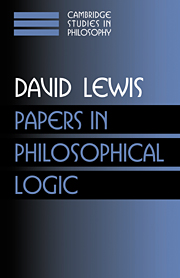Book contents
- Frontmatter
- Contents
- Dedication
- Introduction
- 1 Adverbs of quantification
- 2 Index, context, and content
- 3 ‘Whether’ report
- 4 Probabilities of conditionals and conditional probabilities II
- 5 Intensional logics without iterative axioms
- 6 Ordering semantics and premise semantics for counterfactuals
- 7 Logic for equivocators
- 8 Relevant implication
- 9 Statements partly about observation
- 10 Ayer's first empiricist criterion of meaning: why does it fail?
- 11 Analog and digital
- 12 Lucas against mechanism
- 13 Lucas against mechanism II
- 14 Policing the Aufbau
- 15 Finitude and infinitude in the atomic calculus of individuals (with Wilfrid Hodges)
- 16 Nominalistic set theory
- 17 Mathematics is megethology
- Index
17 - Mathematics is megethology
Published online by Cambridge University Press: 05 June 2012
- Frontmatter
- Contents
- Dedication
- Introduction
- 1 Adverbs of quantification
- 2 Index, context, and content
- 3 ‘Whether’ report
- 4 Probabilities of conditionals and conditional probabilities II
- 5 Intensional logics without iterative axioms
- 6 Ordering semantics and premise semantics for counterfactuals
- 7 Logic for equivocators
- 8 Relevant implication
- 9 Statements partly about observation
- 10 Ayer's first empiricist criterion of meaning: why does it fail?
- 11 Analog and digital
- 12 Lucas against mechanism
- 13 Lucas against mechanism II
- 14 Policing the Aufbau
- 15 Finitude and infinitude in the atomic calculus of individuals (with Wilfrid Hodges)
- 16 Nominalistic set theory
- 17 Mathematics is megethology
- Index
Summary
Mereology is the theory of the relation of part to whole, and kindred notions. Megethology is the result of adding plural quantification, as advocated by George Boolos in [1] and [2], to the language of mereology. It is so-called because it turns out to have enough expressive power to let us express interesting hypotheses about the size of Reality. It also has the power, as John P. Burgess and A. P. Hazen have shown in [3], to simulate quantification over relations.
It is generally accepted that mathematics reduces to set theory. In my book Parts of Classes, [6], I argued that set theory in turn reduces, with the aid of mereology, to the theory of singleton functions. I also argued (somewhat reluctantly) for a ‘structuralist’ approach to the theory of singleton functions. We need not think we have somehow achieved a primitive grasp of some one special singleton function. Rather, we can take the theory of singleton functions, and hence set theory, and hence mathematics, to consist of generalisations about all singleton functions. We need only assume, to avoid vacuity, that there exists at least one singleton function.
But we need not assume even that. For it now turns out that if the size of Reality is right, there must exist a singleton function. All we need as a foundation for mathematics, apart from the framework of megethology, are some hypotheses about the size of Reality.
(Megethology can have no complete axiom system; and it would serve little purpose to fix upon some one official choice of an incomplete fragment.
- Type
- Chapter
- Information
- Papers in Philosophical Logic , pp. 203 - 230Publisher: Cambridge University PressPrint publication year: 1997
- 1
- Cited by

